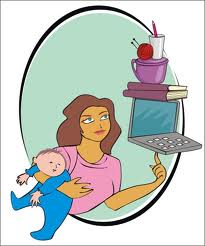Introduction:
“Sometimes I lone to see the moon. But there is no time. I site on the veranda, but I am not concentrating on the moon, so what will I do in the office, for my Children.
The work that human beings do falls generally into four categories: Production, reproduction, status enhancement, morale building. Although both men and women do all these kinds of workwomen’s work in these spheres feels and looks quite distinct from men’s work. Throughout the ages women home lined in the “men’s world” saturated by male dominating ideology. Only in recent times there has been a growing awareness among working women of many societies. “Nearly there can be no sustainable human development, nor any successful population program. Without the full and equal participation of women” (Boutora-Boutora ghali, 1995).
A mother is a woman as she is related to her Child or Children; or a female parent of a Child. This research is about the matters of urban middle class family who are working in remunerative occupations. Where the housewife, matters have to stay at home only, the working mothers have two clusters of duties, household or family and job place or workplace, while traditionally have been considered full time occupation. In the Dhaka city of Bangladesh, a significant number of matters work as working of autonomous body, government employees and for non-government employees. Working matters are thus doubly stigmatized by society, which casts than both as matters and as employees.
Questionnaire
- Name of the respondent:
- Age:
- Type of the family:
- Number of family members:
- Total monthly income of the family:
- Occupation of the respondent:
- Monthly income of the respondent:
- Address of living place and work place:
- Husband’s occupation:
- Educational qualification:
- Reason of doing the job:
- Number of children and their education:
- Age of the children:
- Can you take the decision about your child bearing? :
- Parent’s attitude towards women’s education and profession:
- What kind of activities do you perform at home? :
- Taking care of children.
- Taking care of husband.
- Cooking.
- Cleaning the house.
- Receiving guest.
- Washing cloths and so on.
- Child care arrangements:
- By husband.
- By parents.
- Permanent maid servants.
- Temporary maid servants.
- Workplace oriented day care center.
- Expenditure and savings:
- Food.
- House rent (Including water, fuel, electricity, gas).
- Clothing, shoes, medicine.
- Conveyance.
- Education.
- Savings (D.P.S, insurance premium, provident fund, share certificates, etc.).
- Entertainment.
- Treatment.
- Presentation or gift.
- Servant’s salary.
- Bestowal or donation.
- How do you spend your leisure time? :
- Reading books and magazines.
- Sewing.
- Watching movies in cinema hall.
- Watching television.
- Enjoying songs.
- Gardening.
- Moving around relative’s home.
- Wandering in the beautiful places.
- Going to fair & park.
- In different way.
- Does your child help you in your works at home? :
- What kind of work does your husband do at home? :
- Who is the closest person in your family and why? :
- If needed, will you leave your job? :
- Which is the most favorite to you- child or job? :
- Which is the most favorite to you- money or love? :
- Do you have any desire to have more children? :
- Whose decision is the final decision in your family? :
- In your opinion, how many children are enough for a working mother? :
- Do you think three or four months pregnancy leave is enough for a working mother? :
- Which you prefer most- breast feeding or bottle feeding and why? :
- Do you think, working mothers are more expert and informed about the outside world than house wife mothers? :
- Do you think, working mothers live in more tension and anxiety than housewife mothers? :
- Do you have any kind of physical or mental problem in case of over work load? :
- What do you do in the weekly or government holiday? :
- How do you go to your workplace? :
- How long you have to work? :
- Do you take your lunch with you regularly? :
- Are you satisfied with your present job? :
- What is your future plan? :
- Why have you chosen this occupation? :
- Do you have any interest to leave this occupation? :
- What type of problem do you face during going to workplace? :
- What is the reason of doing this job? :
- Bad things about your job:
- Good things about your job:
- Who have inspired you to do the job? :
- What kind of problem do you face in home for working outside? :
- How do you solve them? :
- Does earning money enhance working mother’s position at home and in society? :
- Do you think that husband should be a helpful company in housekeeping tasks? Why? :
- Do you want that your daughter would be also a working mother? :
- What is your perception about the employment of women? :
- Family and workplace- can you balance in both the sector equally?:












